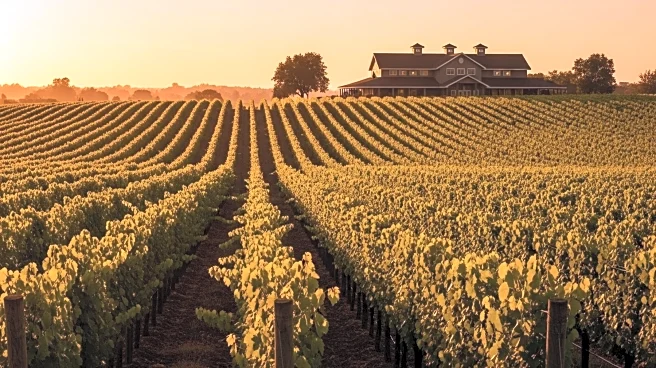What's Happening?
Gal Pauker, the grandson of Gideon Pauker, who was murdered in a Hamas attack on October 7, is expanding his family's winery in Nir Oz, Israel. Despite the tragedy, Gal is determined to grow the winery beyond its original scope, transforming it from a memorial project into a commercial enterprise. The Pauker Winery plans to produce over 50,000 bottles annually, with new vineyards planted at Ein HaBesor. This expansion is seen as a way to process trauma and provide purpose, as Gal continues to honor his grandfather's legacy while building a future for the winery.
Why It's Important?
The Pauker Winery's expansion represents resilience and the ability to find hope and purpose in the aftermath of tragedy. It highlights the role of agriculture and entrepreneurship in healing and rebuilding communities affected by conflict. The winery's growth could contribute to the local economy, providing jobs and fostering community spirit. It also serves as a testament to the enduring human spirit, demonstrating how personal loss can lead to new beginnings and opportunities for growth.
What's Next?
As the Pauker Winery expands, it may attract attention from wine enthusiasts and investors, potentially boosting tourism and economic activity in the region. The winery's success could inspire other businesses in conflict-affected areas to pursue growth and innovation. Gal Pauker's journey may also influence discussions on the role of entrepreneurship in trauma recovery, encouraging support for similar initiatives. The winery's development will be closely watched as it navigates the challenges of scaling production while maintaining its commitment to quality and heritage.
Beyond the Headlines
The story of Pauker Winery underscores the broader cultural and emotional dimensions of entrepreneurship in the face of adversity. It raises questions about the intersection of business and personal healing, exploring how commercial ventures can serve as therapeutic outlets. The winery's expansion also highlights the importance of preserving cultural heritage and community identity, even as it evolves into a larger enterprise. This narrative may resonate with those seeking to understand the complex dynamics of rebuilding lives and businesses after conflict.










